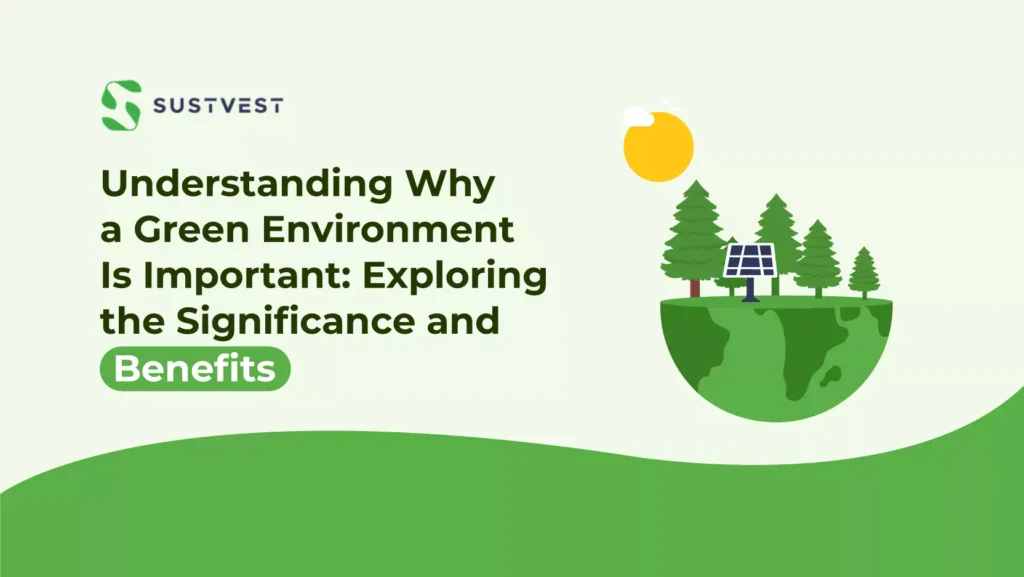
You may have come across the phrase ‘going green’ concerning environmental conservation. However, what are the reasons for adopting this lifestyle? What are the benefits of going green, what does it entail, and how can you successfully embrace it?
Going green refers to adopting an eco-friendly approach to living and making changes to your everyday habits and consumer choices to protect the planet and reduce your impact on it.
One way to be environmentally friendly is by adopting simple eco-conscious practices like recycling or composting. Alternatively, you can make more significant changes by completely transforming your energy consumption habits.
There are numerous ways to go green, and we will delve into these options and explore their respective benefits.
What Does Going Green Means?
In simple terms, to go green means finding a balance between the life you lead, the impact that life and your choices have on the planet, and being mindful enough to help maintain ecological balance to preserve the planet, its ecosystems, and its natural resources. Not an easy feat since our society is not set up in a way to help us succeed.
We live in a linear economy rooted in the “take-make-dispose” step-by-step plan. This means natural resources (raw materials) are collected, then manufactured into the products we buy that are used, and then ultimately discarded as waste.
Our planet is growing at a rate that is not sustainable, it’s expected that the world’s population will hit 9.8 billion people by 2050, and we’d need two planets to support our current consumption, and it’s why the move to go green is more important than ever.
For those who resist the call to live more harmoniously with nature, remember it’s more than melting ice caps and tree-hugging, it’s about safeguarding the future of the human species and recognising that we are a part of nature, not separate from it.
Many industries have taken up this green initiative but why? Let’s see.
Why are businesses taking up green initiatives?
Green practices or initiatives are things that businesses do to reduce their environmental impact, like reducing energy consumption, using eco-friendly materials, promoting sustainable transport, and reducing waste. Green practices help to address urgent environmental challenges like climate change, pollution, and the overuse of natural resources.
Many businesses have adopted green initiatives as part of their CSR objectives to show that they’re taking steps to minimise their negative environmental impact and contribute to a more sustainable future. Green practices can benefit organisations by lowering costs, improving efficiency, and promoting a positive public image. They also demonstrate a commitment to ethical business practices, which can help to build trust with customers and stakeholders.
But what is the concept of a green environment? Let’s see.
What Is The Concept Of The Green Environment?
The principle or concept of a green environment covers several points, including supporting the use of renewable materials, applying sustainable consumption and production, minimizing waste, and reducing toxic pollutants (land, water and soil).
Furthermore, the main objective of implementing these practices is saving the Earth by preventing the exploitation of natural resources and preserving the environment. Several other concepts support a green environment, such as green chemistry, green economy, green tourism, and green energy. All three work together to fight climate change and slow down the effects of global warming.
Have you wondered why a green environment is important? Let’s see.
Benefits Of a Green Environment
By choosing to go green you are helping to make the world a better place. Going green is about getting back to basics and choosing to simplify your life. It’s about making new choices, ones that are healthier for you AND the planet, and making sure we have a planet for generations to come. Let’s take a look at some of the benefits of what it means to be green.
Reduce Pollution
When you make mindful decisions based on an item’s impact on the planet, you are having a direct effect on reducing soil, water, and air pollution. Choosing to compost your food for example reduces methane gas produced in landfills which will, in turn, lower greenhouse gas emissions.
If you choose organic food you are helping to keep harmful pesticides out of our soil and water. Using alternative energy sources also helps to reduce the burning of fossil fuels. Recycling and reusing means less natural materials are being taken from the earth to make new ones.
Preserve Wildlifе
The Millennium Ecosystem Assessment, which involved more than a thousand experts, estimated an extinction rate of up to 8,700 species a year, or 24 a day. More recently, scientists at the U.N. Convention on Biological Diversity concluded that: “Every day, up to 150 species are lost”. That could be as much as 10 percent a decade.
It’s hard to tell what the exact numbers are, most of this data comes from computer modelling. But what we do know is it’s happening and it’s happening fast. By choosing to tread more lightly on the planet you are directly helping to preserve wildlife. You see the paper you use daily at work is responsible for massive deforestation, and the same goes for your toilet paper.
By choosing recycled paper products you are aiding in slowing the rate of extinction for animals living in the forest. Not only are woodland creatures at risk but so is marine life. Our oceans and lakes are filled with all kinds of pollutants, one of the biggest threats being plastic.
Reduce Consumption
Reducing consumption means creating less waste (especially in the kitchen) which means fewer things you have to toss in the garbage which means less of it has to go to landfills.
The food we eat, the energy we burn, and the things we buy are all tied to greenhouse gas emissions. Reducing consumption helps to mitigate climate change by “limiting greenhouse gas emissions associated with the production of goods and services.” This action also helps to save you money.
Buying less and going green does not mean spending a fortune on organic food, solar panels, or hybrid cars. At its core, green living is about moderation, efficiency, and living less expensively. The more stuff you have the more you have to spend to take care of it. This leads to the final point…
It Saves You Monеy
A lot of the time when people start a green life they think they need to throw out all their “non-green” things and replace them with more eco alternatives. This is not always the case though. If you are choosing to get rid of paper towels (I hope you are) you can either invest in un-paper towels or you can simply cut up old towels and t-shirts and use them as rags.
These smaller actions save you a ton of money in the long run. Turning off the light when you leave the room saves you money on your electric bill. You can save a ton of money on water costs by taking small steps in the bathroom to save cash and water.
Did you know that going green has health benefits? Let’s see what are they.
Health Benefits Of Green Environment
There are so many benefits to living a more mindful life. Studies have shown that eating a more plant-based diet can help both the planet and your health. You can also enjoy nutritious food without any trace amount of pollution from soil or water which is often a concern. Growing your food also gives you a sense of fulfilment and happiness because you can harvest food directly from your backyard.
Without realizing it, gardening reduces the energy and fuel consumption of food production and transportation.
Being more green means spending more time in nature. Hiking, walking, biking, or doing QiGong.
Nature has so many benefits, did you know it can even help you sleep better? Spending at least 30 minutes a day in nature can be very beneficial to your mental health.
This type of lifestyle also helps to reduce toxins from common things like cleaning products and beauty products. Both of these can have harmful effects on your health.
Did you know, according to a report by the World Health Organisation (WHO), air pollution causes around 2 million premature deaths every year globally?
Nowadays, many businesses are opting for green marketing. But what is green marketing and why is it important? Let’s see.
What is Green Marketing and its Importance?
Green marketing is developing and selling environmentally friendly goods or services. It helps improve credibility, enter a new audience segment, and stand out among competitors as more and more people become environmentally conscious.
Did you know the chemicals manufactured by factories can be found anywhere, that is why many companies consider producing their goods in a more environmentally friendly manner. Moreover, the level of ecological awareness among consumers is increasing, and people are eager to purchase eco-friendly products despite their higher prices.
Many brands try their best to address the wishes of their customers and have started the production of such goods to their responsibilities as residents of this planet. Green marketing has a positive influence on people’s health and the state of the environment. This type of marketing entails every stage of a business, from packaging to public relations.
Before we conclude let’s look into some of the most commonly asked questions.
FAQ: Why Green Environment Is Important
What is the concept of a green environment?
“Green Environment” relates to the concerns for environmental conservation and improved health of the environment. This includes supporting practices like informed consumption, conservation practices and investment in renewable energy.
What does it mean to be green and why is it important?
Being green is sustainably living one’s life and ensuring that our activities as individuals or a community reflect our planetary resource limits. We depend on our environment for practically everything: from the air we breathe to the water we drink and the food we eat to let’s face it pretty much everything.
What are the objectives of a clean green environment?
- Support sustainable human and ecological use and reuse of remediated land
- Minimize impacts on water quality and water resources.
- Reduce air toxics emissions and greenhouse gas production.
- Minimize material use and waste production.
- Conserve natural resources and energy.
Conclusion
A green environment is related to sustainable development. It focuses on how your behaviour and life can influence the environment positively. Besides, green living also benefits you by bettering your mental health, saving your budget, and ensuring better health and well-being.
You can try this lifestyle by shifting your vehicles to bikes, gardening, buying from locals, and thrifting. They may look small, but when you do it all together, such actions will bring big impacts to our mother earth. Apart from these wonderful perks, it is of paramount importance to create a sustainable environment for future generations.
Protect the environment! Go Green!

Founder of Sustvest
Hardik completed his B.Tech from BITS Pilani. Keeping the current global scenario, the growth of renewable energy in mind, and people looking for investment opportunities in mind he founded SustVest ( formerly, Solar Grid X ) in 2018. This venture led him to achieve the ‘Emerging Fintech Talent of the Year in MENA region ‘ in October 2019.




